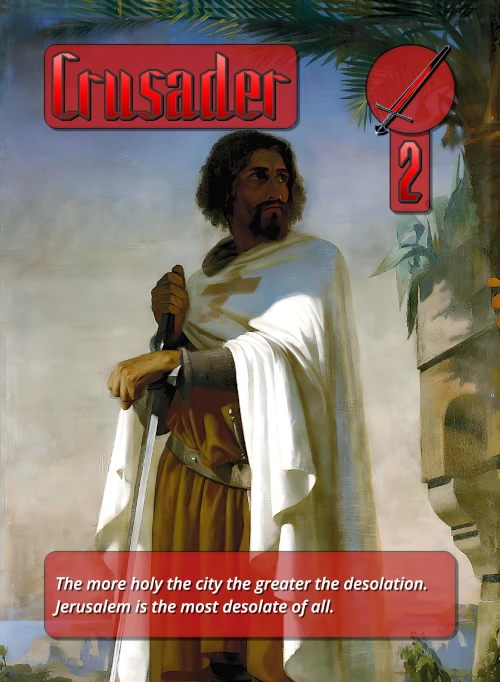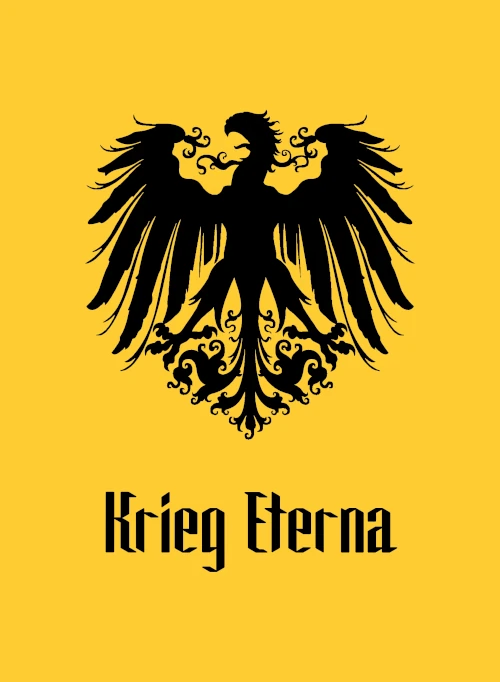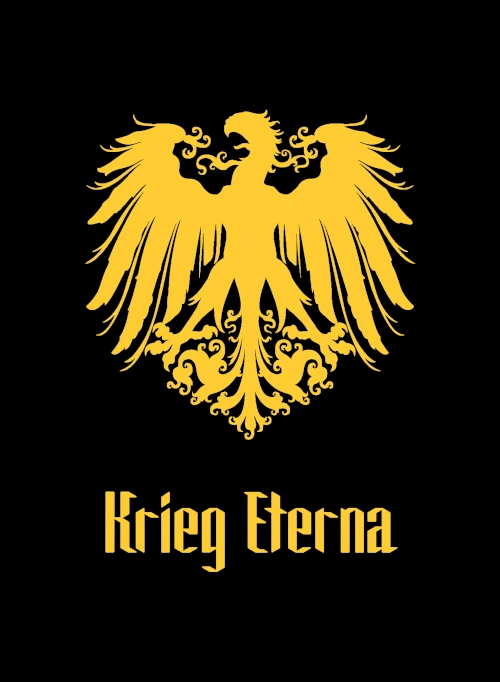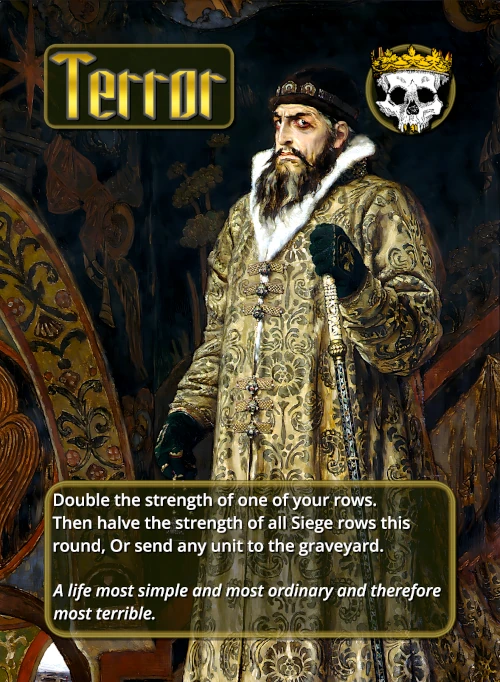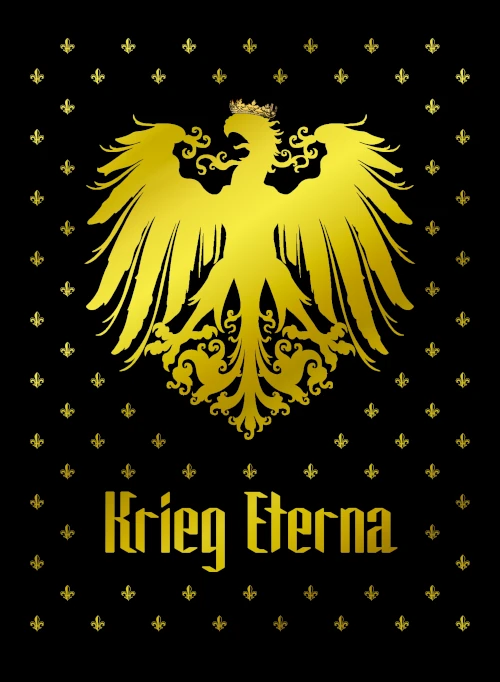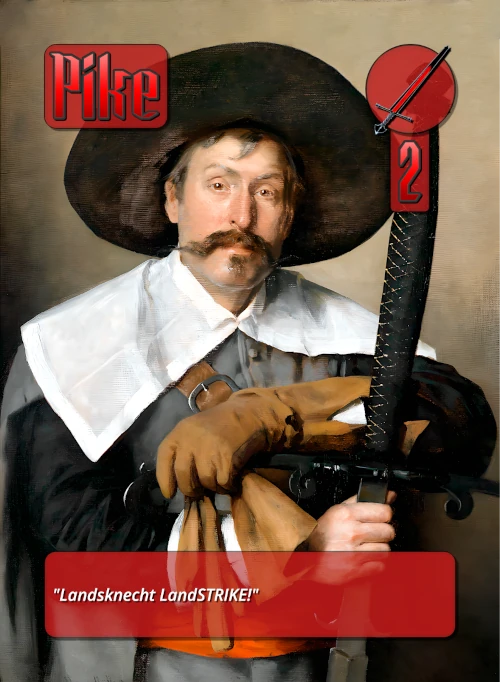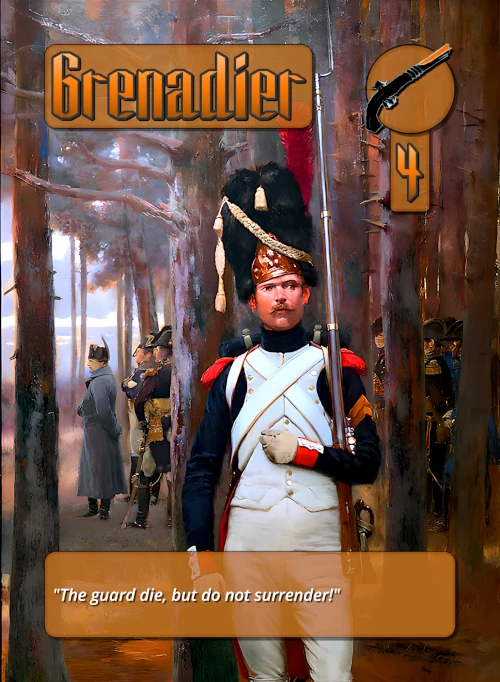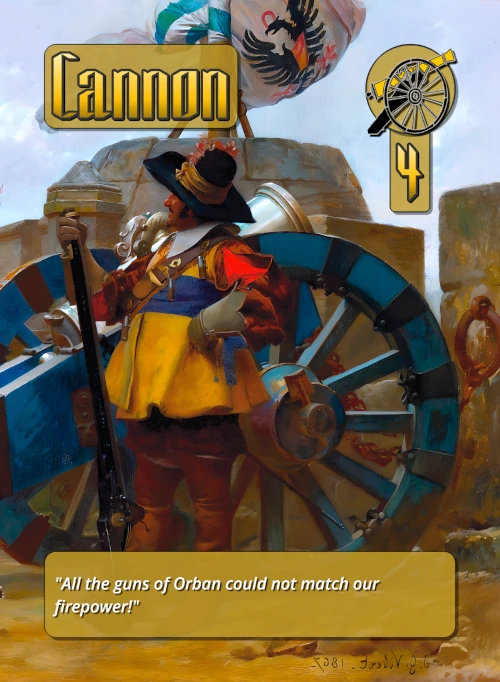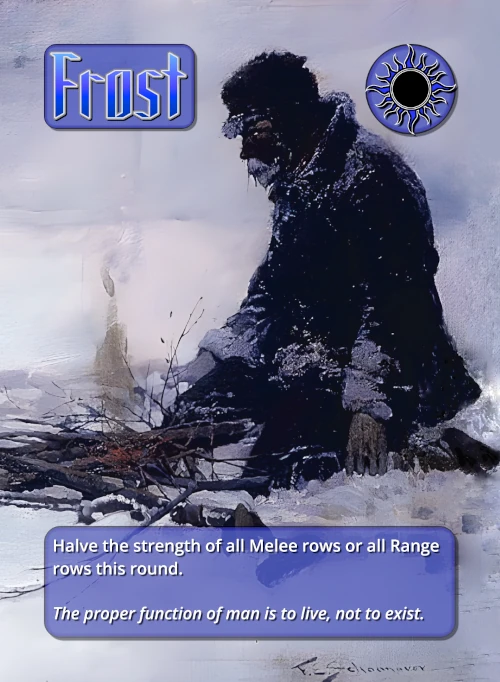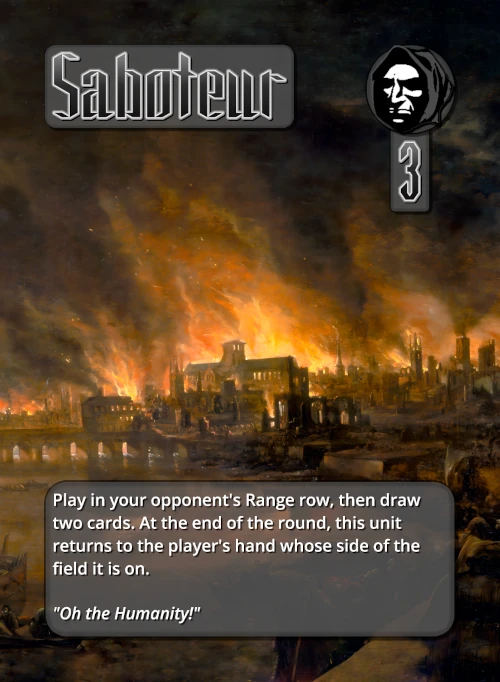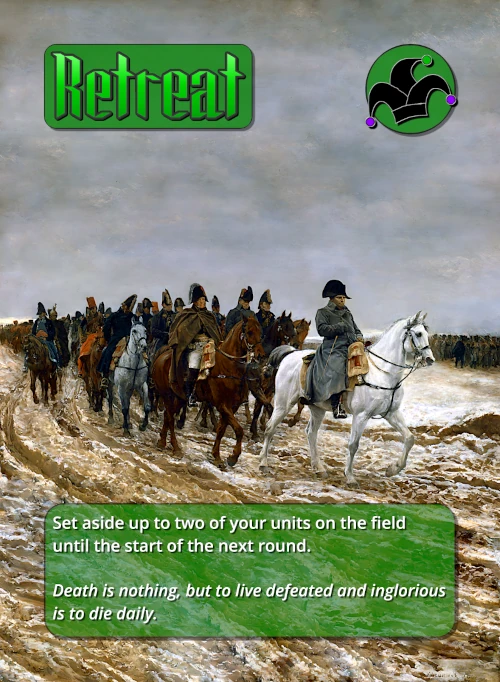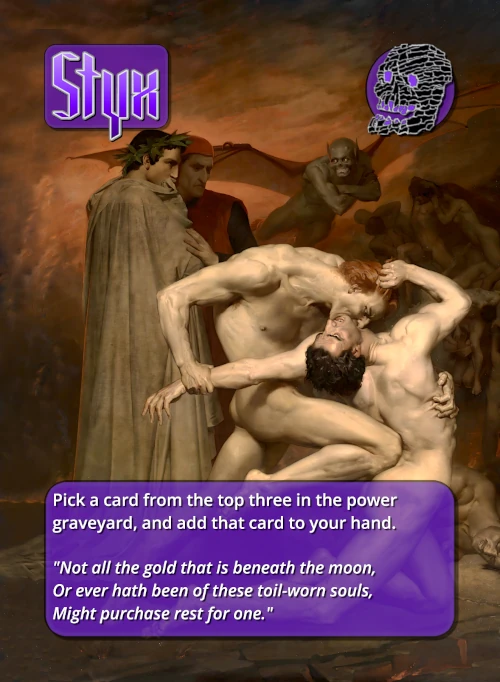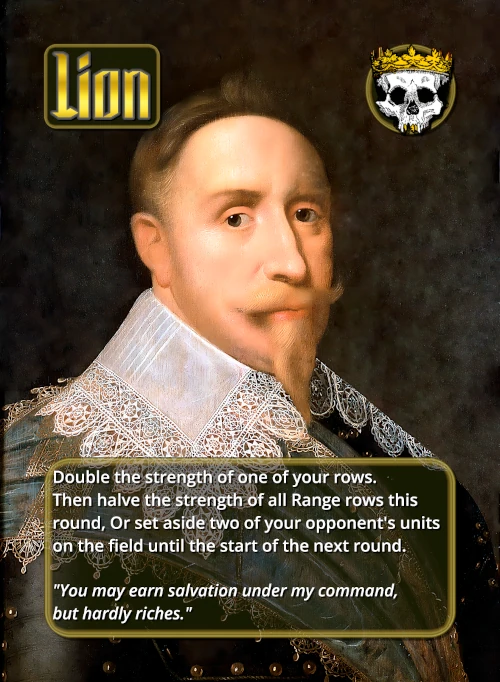Rulebook
Rulebook
Krieg Eterna is a game of strategizing and bluffing your way to victory across a series of battles against your opponent. Command your army in the field to attack with precision, deceive enemy officers, and overrun opposing regiments!
Gameplay
Gameplay
A game of Krieg Eterna is divided into three separate rounds of play, where your ultimate objective is to win more rounds than your opponent. Players take turns playing units and powers to build the strength of their army. At the end of each round, the player with the most strength across all of their rows wins that round.
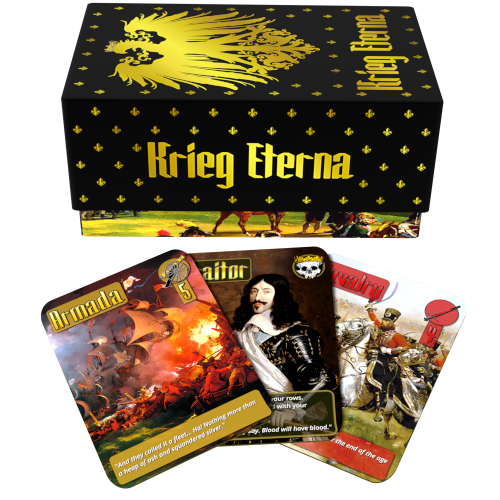
At the start of the game, each player draws 9 unit cards, 4 power cards, and 1 King card. After review, players must discard 3 of their cards (any type) before play begins. Unless a card says otherwise, these are the only cards drawn for the entire game. Players then take turns playing one card at a time until all players have said "pass", after which they score the field, discard all cards on the field to the graveyards (face up), and start the next round.
Playing Field
Playing Field
Next is a diagram showing the layout of the playing field. Each player's side of the field is split into three rows: Melee, Range, and Siege. There is no limit to the number of cards played in rows, and unit cards may be rearranged within a row at any time.
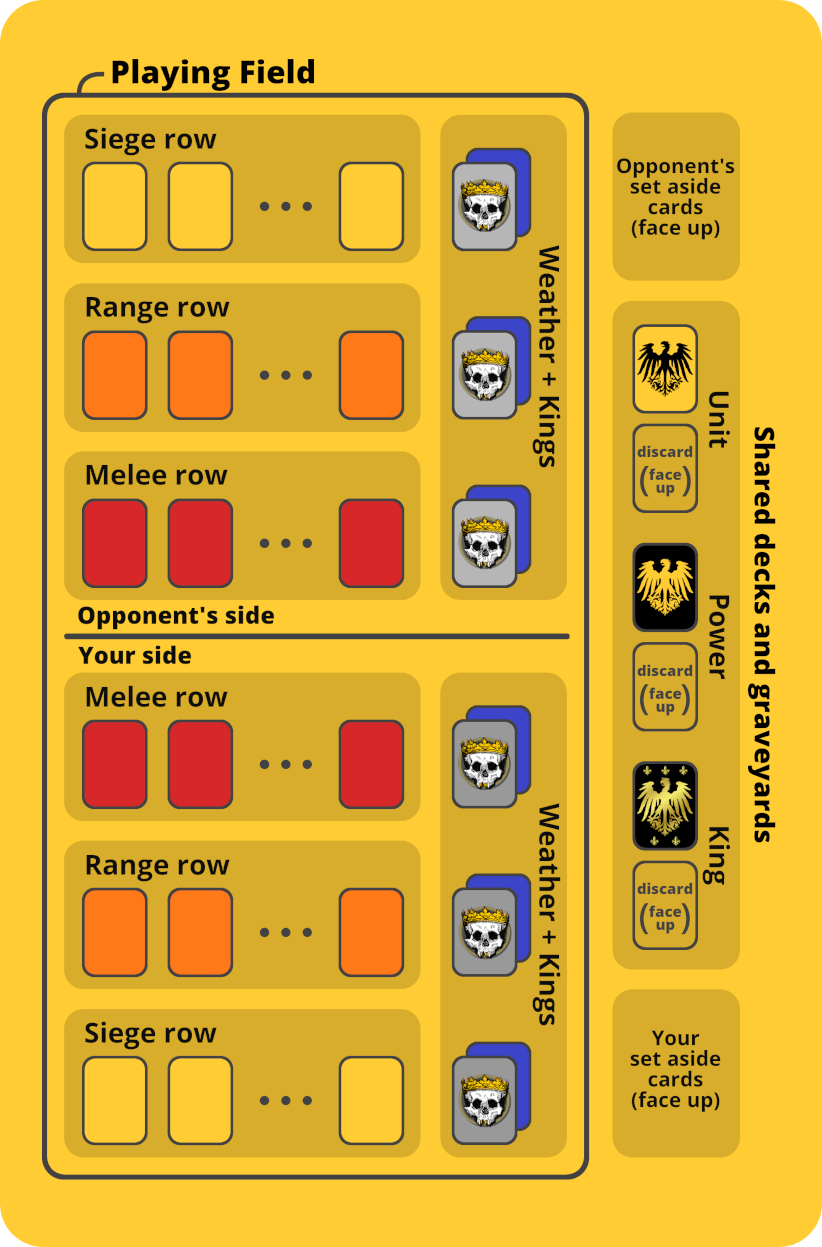
Cards
Cards
There are three separate decks of cards shared between all players: the unit deck, power deck, and King deck -- each with a different colored card-backing. Each deck also has its own graveyard, in which discarded cards are placed face up. Within each deck there are different card types, indicated by the symbol in the upper-right corner of a card.
Units
Units
The unit deck consists of Melee, Ranged, and Siege cards. All unit cards have a base strength number in the upper-right corner, indicating how many points they will score at the end of a round. The total strength of a unit can be increased or decreased beyond the base strength using the effects of other cards.
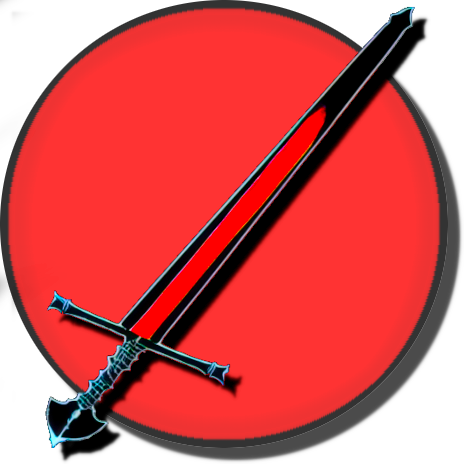
|
Melee units go in the front row, closest to your opponent. |
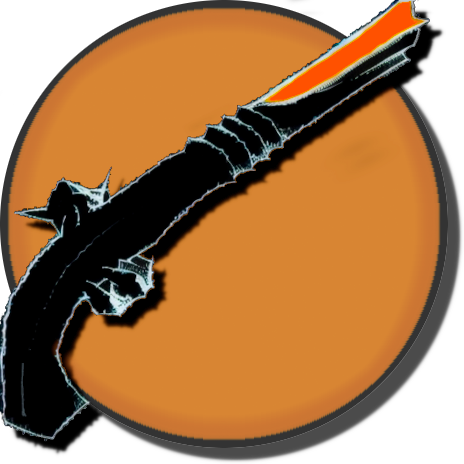
|
Ranged units go in the middle row. |
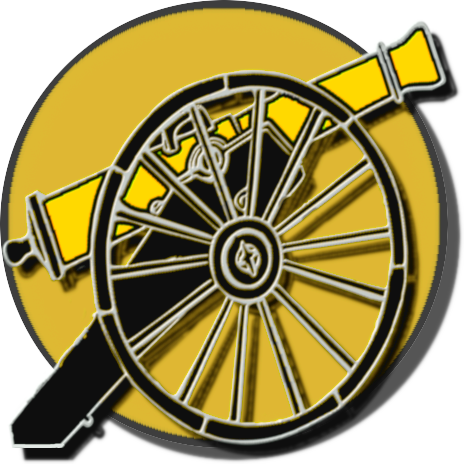
|
Siege units go in the back row, closest to you. |
Powers
Powers
The power deck consists of Weather, Spy, Jester, and Hex cards, each with a card effect granting unique abilities. Unless otherwise indicated, these cards are played to the side (not in the Melee, Range, or Siege rows) and immediately go to the graveyard after use.
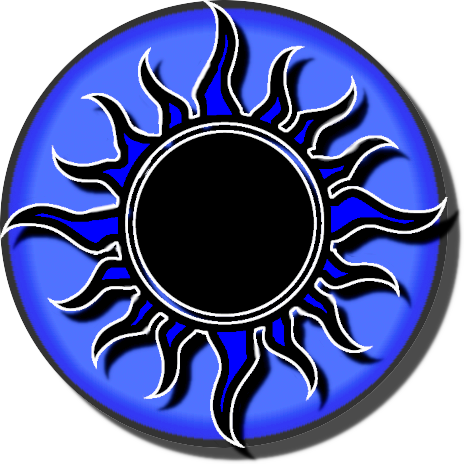
|
Weather cards affect the total strength of one of the rows, for all players. Within the affected row, Weather applies individually to each unit; always round unit strength down when dividing, with a minimum strength of one per unit. Keep Weather cards on the field until their effects end. |
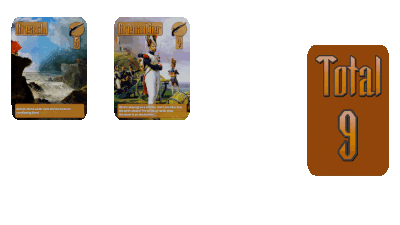

|
Spy cards allow you to draw cards, but are played as units on your opponent’s side of the field, thereby adding to your opponent’s total strength. At the end of the round, most Spys go directly to the hand of the player whose side of the field they are on, allowing your opponent to turn your Spys against you. |

|
Jester cards can return cards on the field back to your hand, or set them aside for the next round. Use them to deceive your opponent. |

|
Hex cards allow for drawing cards, sending cards to the graveyard, or other useful effects. Hex cards attached to a specific unit follow with that unit, e.g. to the graveyard, another row, or even a player’s hand. |
Kings
Kings
The King deck contains all King cards, and each player should choose one at random at the start of the game. Each player's King card can only be scored in one round per game (i.e. it does not return to your hand each round). King cards are not affected by other cards, unless specifically mentioned.
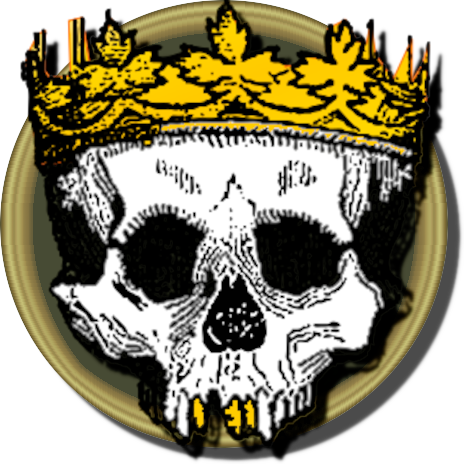
|
King cards allow you to double the strength of one of your rows, as well as having a choice between other unique effects. A King only doubles the row while it remains on the field. |
Adjacency
Adjacency
If two units with the same strength are in the same row, they get an adjacency bonus which doubles the strength of both units. Adjacency bonuses only apply to units with two or three strength. You cannot add a third unit to this adjacent pair, but you can have multiple pairs on the field. Note that adjacency effects can be enabled or broken by power cards that modify a unit's strength.
Example 1:
A row has 3 units with base strength 2. Two units form an adjacent pair, but the third does not get a bonus. The row's total score is: (2 × 2) + (2 × 2) + 2 = 10.
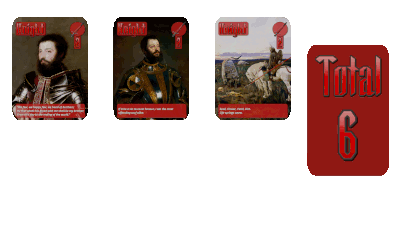
Example 2:
A row has 2 units with base strength 4. A certain power is then played to subtract 1 strength from all units in that row. Both units now have strength 3, and so receive an adjacency bonus. The row's total score is: ((4 - 1) × 2) + ((4 - 1) × 2) = 12.
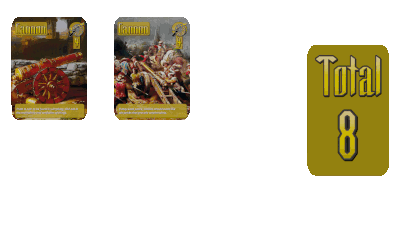
Passing
Passing
Before playing any cards on your turn, you may say "pass" to signal you are ready to end the round. Once a player has passed, they may not play any more cards until the next round. Other players may continue to play cards, taking as many turns as desired before eventually passing themselves. After all players have passed, the round is scored.
Scoring The Round
Scoring The Round
Each of your units on the field contributes its total strength to your score for the round as follows:
- Start with each unit's base strength number found in the upper-right corners of the cards.
- Apply all modifiers with keywords: set base strength.
- Apply all modifiers with keywords: add or subtract base strength.
- If there are adjacency bonuses at this point, double the strength of units forming adjacent pairs.
- Apply all row multipliers (keywords: double or halve strength) from weather effects and King bonuses to each unit. Always round down if dividing, with a minimum strength of one per unit.
Winning
Winning
After adding all units' total strengths together, the player with the highest number wins the round (the size of the victory does not matter).
The first player to win two rounds wins the game. If no player has won two rounds and no player can play any cards, the game is a draw.
Final Details
Final Details
- Going first: In the first round, the player who dealt the unit deck (or won the last game) goes first. In later rounds, the previous round's winner goes first.
- If a card says to draw, you may pick any combination of unit or power cards, unless otherwise specified. King cards are never drawn after the initial setup.
- If an opponent asks, you must tell them the number of unit and power cards you have in your hand.
- Set aside cards do not score for the current round and cannot be affected by other cards this round. At the start of the next round, return them directly to the field, in their same row (do this before the first turn is taken). Do not repeat any card effects.
- If a power card has an activation cost (e.g. "send a unit to the graveyard"), you must pay its price in order to play the card at all. This prevents players from stalling with unusable/undesired power cards.
- Players may never skip their turn. They must always either play a card, or "pass" the rest of the round.
Additional Players
Additional Players
When playing Krieg Eterna with more than two players, the setup and gameplay should be modified as follows:
3 Players:
With three players, Krieg Eterna becomes a free-for-all where your objective is to earn the most rank points across three rounds. Unlike the two-player version, all three rounds are always played before determining the winner.
- Setup: Each player should draw 9 unit cards, 4 power cards and 1 King card. After review, players must discard 3 of their cards before play begins.
- Field: Each player has their own separate set of rows (e.g. players should not share rows, adjacency, or Kings).
- Turns: Turn order should proceed clockwise. As usual, the player who won the previous round starts the next.
- Scoring: At the end of each round, determine the total strength of each player's field and award rank points based on their position. For example, the player with the highest total strength earns two points, the next player earns one point, and the last player earns no points.
- Winning: The player with the most rank points added up across all three rounds wins the game. In the event of a tie, the player who most recently won a round takes the advantage.
4 Players:
With four players, Krieg Eterna becomes a team battle of two versus two. As usual, each team tries to win the best of three rounds. During setup and gameplay, players should never show their hands to teammates; however, teams may openly strategize as long as all opposing players also have access to the communication.
- Setup: Each player draws 6 unit and 3 power cards, then must discard 2 cards after review. Next, without revealing their hands, each team chooses only one of their players to draw a King card.
- Field: Players on each team share their side of the field (e.g. teammates share rows, adjacency, and Kings). This means that teammates work together to build a single army.
- Turns: Turn order should alternate between individual players on opposing teams. Teammates can never play on your turn for you, even if you have already passed. After you pass, your teammate stays in the round until they separately decide to pass.
- Scoring: The team with the highest combined total strength wins the round, similar to the two-player version.
- Winning: The first team to win two rounds wins the game.



